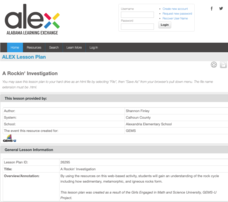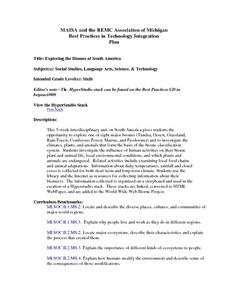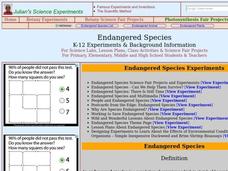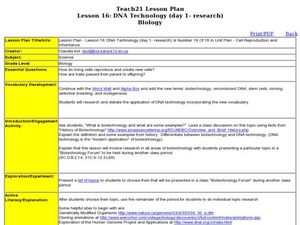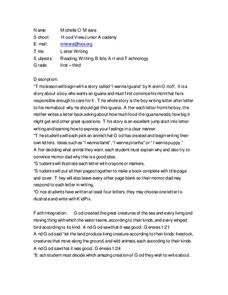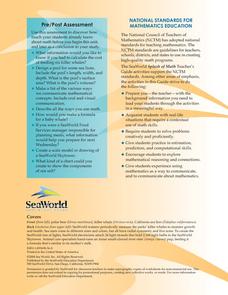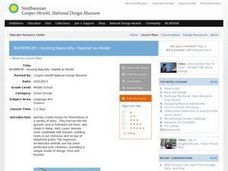Curated OER
The Bottom Line
Seventh graders assume the role of stockholders in a fictitious biotech company. After investigating the cloning of pets, the effects of cloning on the health and well being of the cloned animal, and the ethical issues involved, groups...
Curated OER
Let's Get Moving
Students participate in sports activities that relate to motion, velocity and momentum. They produce a PowerPoint presentation after researching the activities.
Curated OER
Monarch Migration
Third graders investigate the life cycle of the Monarch butterfly. They experiment with various tools to simulate the mouth parts of insects, conduct research, record their observations of butterflies hatching, write a play, complete...
Alabama Learning Exchange
A Rockin' Investigation
Young scientists identify the rock cycle. In this earth science activity, learners participate in web-based research to understand how sedimentary, metamorphic, and igneous rocks form. As a follow-up, they collect various rocks and...
Curated OER
Puppetry
Students explore puppetry. For this puppetry lesson, students research the history and culture of puppets. Student begin to understand that art work has special characteristics. Students create their own marionette puppet.
Curated OER
The Velveteen Rabbit
First graders discuss and touch stuffed animals and a real rabbit. They complete a KWL chart about rabbits. They listen to the story The Velveteen Rabbit and discuss it. They research rabbits in the library and make a book.
Curated OER
Exploring the Biomes of South America
Sixth graders complete a five-week unit investigating the eight major biomes of South America. They conduct Internet research, collect short-term and long-term climate data, and create a HyperStudio slideshow stack about a selected biome...
Curated OER
Endangered Species
Students create a postcard about endangered species. In this biology lesson, students identify how human activities endanger other species. They research and recommend ways to help protect them.
Curated OER
Lesson 16: DNA Technology
Students research different areas of biotechnology. In this biology lesson, students create a presentation about their research. They debate the topic presented and share their views on the subject.
Curated OER
Which Animals Should Be Saved?
Fifth graders investigate the concepts related to the endangerment of different animal species. They conduct research using a variety of resources. The skills of prediction are used to show the possible outcome of the extinction of a...
Curated OER
When Dinosaurs Ruled
Students research about plants and animals during Triassic period. In this earth science lesson, students draw pictures of their chosen plants and plants for the bulletin board. They present their project in class.
Curated OER
Animals of Madagascar
Students are each assigned an animal from Madagascar. They research their animal and design a picture book about their animal. Students design a cover page, back page, bibliography page and the title page. Their book will contain...
Curated OER
Chemistry World The Five Types of Chemical Reactions
Students research five types of chemical reactions in order to design a learning center. Students use technology to research and present their material.
Curated OER
The Rainforest
Second graders investigate the five different layers of the rainforest. They conduct research to find details pertaining to the animals and the interactions of the existing food chain in each layer of the forest. Students construct a...
Curated OER
THE FOODS WE EAT
Learners discuss the five food groups and the seven basic nutrients. They decorate Food We Eat booklet pages with pictures of foods found on background, rubber stamp and animation tools in KidPix. (Booklet has a page for each food group.)
Curated OER
Letter Writing
Students investigate different types of animals in a unique way. They use a variety of resources to find information. Students read a story about an iguana and then write their own letters using a character of an animal found in the...
Curated OER
Technology in the Early Education Classroom
Students explore computers. They type their names and use different fonts. They create mini-posters using Kid Pix software and use the Oregon Trail software to discover the westward trek in United States history. They explore websites...
Curated OER
The Intertidal Zone
Students research the diverse animal and plant life that inhabit the intertidal zones along the Pacific rocky coast. As students progress through this lesson, they begin to recognize distinct behaviors, adaptations, and characteristics...
Curated OER
Moo Who?
Students read the books Moo Who? and Boo Hoo Moo and do language arts activities with them. In this language arts lesson plan, students are assigned activities based on the two books given. The activities include onomatopoeia activities,...
EngageNY
Interpreting Residuals from a Line
What does an animal's gestation period have to do with its longevity? Use residuals to determine the prediction errors based upon a least-square regression line. This second lesson on residuals shows how to use residuals to create a...
Sea World
Splash of Math
How can kids use math to learn about marine life? Combine math skills with science lessons in a resource featuring activities about life in the sea. Kids graph and calculate data, solve complex word problems, measure geometric shapes,...
University of California
Impact of the California Missions on Native Americans
While the Spanish claimed to bring civilization to California indigenous peoples, in reality, they also brought violence and forced assimilation to European values. Primary sources, such as the reports of Catholic priests and Europeans...
Curated OER
Where the Red Fern Grows: A 4th Grade Literary Focus Unit
Fourth graders explore the human and animal connection along with the idea that death is a part of the life cycle. They read "Where the Red Fern Grows." Students examine the feelings and emotions surrounding death and they discover the...
Curated OER
BIOMIMICRY, Housing Naturally: Habitat as Model
Students explore natural animal habitats. For this lesson on biomimicry and habitation design, students will use classroom and field examples to examine animal habitats. Students will construct a model of a natural animal habitat. This...





